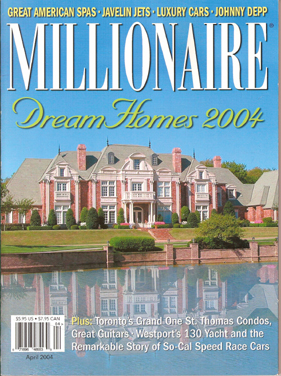

 |
 |
 JOHN PAUL DeJORIA — From Homeless to Multi-Millionaire
JOHN PAUL DeJORIA — From Homeless to Multi-Millionaire
by Kaya Morgan
In Washington D.C., John Paul DeJoria was inducted into the prestigious Horatio Alger Association of Distinguished Americans, joining the ranks of other uber-successfuls such as former Secretaries of State, Colin Powell and Henry Kissinger, Oprah Winfrey, Norman Vincent Peale, J.C. Penny, and billionaire entrepreneur, Wayne Huizenga. It was a momentous occasion for a man who was homeless - twice.
A well-known jetsetter, environmentalist, philanthropist, and multi-millionaire entrepreneur, John Paul DeJoria is frequently seen with friends Kevin Costner, Cher, Michael Douglas, Pierce Brosnan, Fran Dresher, Robert Kennedy, Jr., Sir Richard Branson, and just about every other famous name we could mention, traveling via private jet to any of his six homes scattered around the U.S. — one as big as a shopping mall. While chatting with J.P., as close friends call him, relaxing at his home in Austin, Texas, we uncovered some interesting insights into his secrets of success.
Early childhood was pretty rough for DeJoria, the youngest son of immigrant parents who relocated from Italy and Greece, hoping to find the American Dream. “My parents were divorced before I was two years old. My brother and I started selling Christmas cards and newspapers when I was nine years old. I’d get up at three in the morning with my brother, to fold and deliver papers every morning just so we could live a little better,” recalls J.P. His goals were simpler then, “When I was a kid, my dream was to be able to get a job where one day I could make $150 a week – enough for a small house payment, and a good used car.”
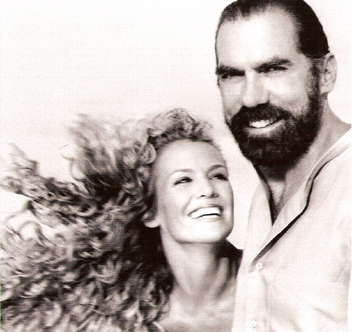 Not unlike other youth growing up in the lower income barios of East Los Angeles, DeJoria soon found himself part of a street gang. But upon graduation from high school, he chose a different path, and enlisted in the U.S. Navy with aspirations of attending college. After his discharge, a brief marriage left young J.P. alone to raise his son as a single parent. Times went from bad to worse. “It was one of the most frightening times in my life,” says DeJoria. “I was homeless twice, mainly because I was too proud to ask anybody for help. In my early twenties, when it was just me and my son, we had no place to live. I used to go out and collect Coke bottles at night, then cash them in at the corner drugstore for two to five cents. We lived on a very simple diet of rice, potatoes, lettuce, cereal, canned soup, and macaroni and cheese, but we managed.”
Not unlike other youth growing up in the lower income barios of East Los Angeles, DeJoria soon found himself part of a street gang. But upon graduation from high school, he chose a different path, and enlisted in the U.S. Navy with aspirations of attending college. After his discharge, a brief marriage left young J.P. alone to raise his son as a single parent. Times went from bad to worse. “It was one of the most frightening times in my life,” says DeJoria. “I was homeless twice, mainly because I was too proud to ask anybody for help. In my early twenties, when it was just me and my son, we had no place to live. I used to go out and collect Coke bottles at night, then cash them in at the corner drugstore for two to five cents. We lived on a very simple diet of rice, potatoes, lettuce, cereal, canned soup, and macaroni and cheese, but we managed.”
He took on a variety of odd jobs to make ends meet from pumping gas and repairing bicycles, to selling encyclopedias door-to-door, then copy machines, and even insurance. As luck would have it, he was offered an entry-level marketing position with Time magazine. Before long, he found himself the Los Angeles circulation manager, well on the way to his next brush with fate. By 1971, he went to work for Redken Laboratories, then the leading professional hair salon product company in the U.S. Within 18 months, he was promoted to national manager overseeing their schools and chain salons, eagerly learning everything there was to know about the business.
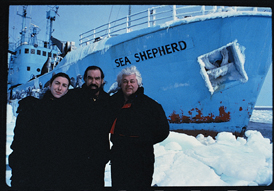
Today, DeJoria heads the multi-million dollar hair empire of John Paul Mitchell Systems with annual retail sales well over $800 million, offering more than 90 products sold in 105,000 hair salons throughout the U.S. and in 75 countries abroad. When not working to expand the JPM brand, JP travels the globe with wife, Eloise and son, John Anthony as stuards of the planet.
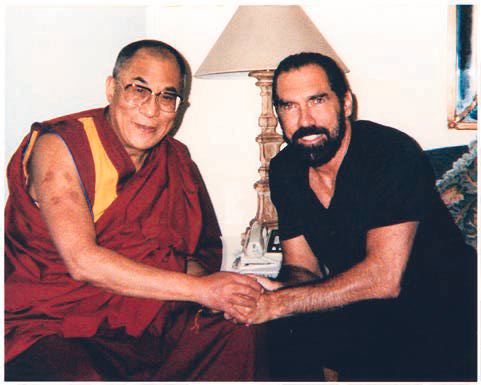 So, what is the secret to this tremendous success? DeJoria’s golden rule of “Success unshared is failure,” runs true throughout the company. Sources from within say that it is a place where people joyfully show up for work as opposed to merely showing up to collect a paycheck. And, he has gone to great lengths to create an atmosphere of success by hiring only the very best people, asking for them to give 110%, and then compensating them higher than what the industry normally pays to let them know their work is valued. His management philosophy is to have “fewer moving parts with no middle management.” Effectively, JPMS does with 160 employees (worldwide) what would normally be done by six or seven hundred employees in any other firm.
So, what is the secret to this tremendous success? DeJoria’s golden rule of “Success unshared is failure,” runs true throughout the company. Sources from within say that it is a place where people joyfully show up for work as opposed to merely showing up to collect a paycheck. And, he has gone to great lengths to create an atmosphere of success by hiring only the very best people, asking for them to give 110%, and then compensating them higher than what the industry normally pays to let them know their work is valued. His management philosophy is to have “fewer moving parts with no middle management.” Effectively, JPMS does with 160 employees (worldwide) what would normally be done by six or seven hundred employees in any other firm.
Always a trend setter in corporate negotiations, DeJoria admits that “leisure hours are my working way of life. For example, I’ll have lunch with a distributor, and I will bring my wife and son along. They really like family values. Then, before you know it, they are asking for me to bring Eloise and John Anthony along.” J.P. has his own ideas on how to deal with difficult people too, “Sometimes, the best thing to do is to have nothing to do with them at all, unless you have to, because you really have to like the people you are dealing with. You know how, sometimes, you feel weird around someone? Follow your instincts – split and run the other way!”
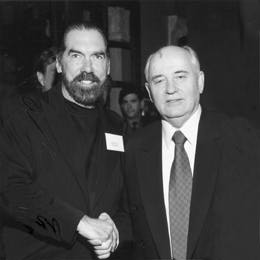 DeJoria considers himself lucky to be surrounded with so many high-powered, fun-loving friends in life. “The difference between successful people, and unsuccessful people, is that the successful people are willing to do the things that unsuccessful people won’t do,” he confidently states. Now that he has reached a pinnacle of success, and is frequently asked to donate to everyone, and everything, he remains discriminating, “You can’t help everyone out. So, you have to pick and choose what you want to do because you can’t do it all!”
DeJoria considers himself lucky to be surrounded with so many high-powered, fun-loving friends in life. “The difference between successful people, and unsuccessful people, is that the successful people are willing to do the things that unsuccessful people won’t do,” he confidently states. Now that he has reached a pinnacle of success, and is frequently asked to donate to everyone, and everything, he remains discriminating, “You can’t help everyone out. So, you have to pick and choose what you want to do because you can’t do it all!”
Equally comfortable with men or women, he tries to remain open to everyone but admits that, “sometimes I am just too trusting. You have to go with your gut feeling about people. Just do your due diligence.” Yet, adamant about his feelings of disgust with “people taking advantage of the lives of animals, or the environment, simply for monetary gain.” As one of the first cruelty-free companies, John Paul Mitchell is a leader in the fight to ban animal testing.
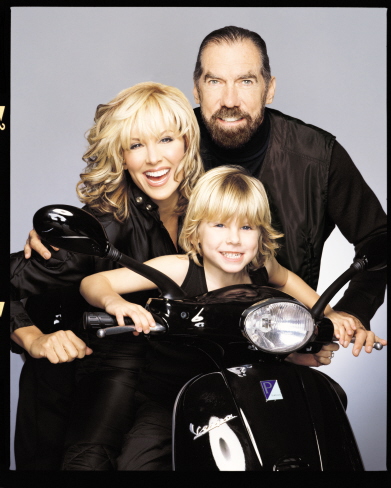 DeJoria has an impressive history of public service having lobbied for a variety of consumer protection issues, and served on several U.S. government and United Nations missions. And, he has personally rode the Sea Shephard, a ship that patrols the Bay of St. Lawrence, to help defend the lives of unsuspecting baby seals, inhumanely harvested for their pure white pelts, as well as devoted considerable time and money to the Water Keepers, founded by Robert Kennedy, Jr. to protect the delicate eco-balance of our world’s waterways.
DeJoria has an impressive history of public service having lobbied for a variety of consumer protection issues, and served on several U.S. government and United Nations missions. And, he has personally rode the Sea Shephard, a ship that patrols the Bay of St. Lawrence, to help defend the lives of unsuspecting baby seals, inhumanely harvested for their pure white pelts, as well as devoted considerable time and money to the Water Keepers, founded by Robert Kennedy, Jr. to protect the delicate eco-balance of our world’s waterways.
Is there anything left that this man hasn’t done? Someday, he says, “I'd love to jump into a hot rod, start out on the beaches of Southern California, and drive straight up Highway 1, listening to 60s music all the way. That, and go on safari.” But, if he were stranded on a South Sea island, besides family, he would want to have along dear friends Marjoe Gortner, Robin Leach and John Capra. Oh,” he laughed, having a light bulb moment, “wait a minute, Dan Akroyd – can I have 10 people?” he laughs again.
Yet, when asked what ranked so high on his list that without it, life wouldn’t be worth it, he quickly replied, “Happiness….because if you’re not happy with what you’re doing, life just isn’t worth living.”
For more about John Paul Mitchell Systems, go to www.jpms.com
More stories by journalist, Kaya Morgan, can be found by clicking the link. Contact us for reprint rights as most articles are available.

All rights reserved ©
Press Coverage | VentureCapital | Business Development | Venture Opportunities | Resources | Contact Us | Investor Extras | Home